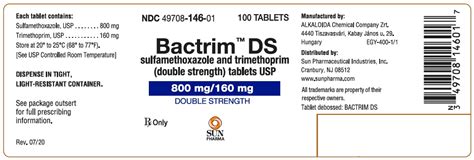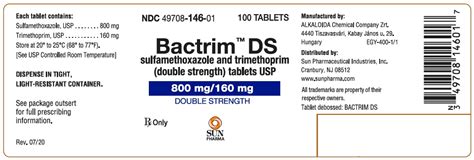Intro
Discover Bactrim DS side effects, including allergic reactions, diarrhea, and nausea. Learn about rare but serious interactions, warnings, and precautions to minimize risks when taking this antibiotic medication.
Bactrim DS, a combination antibiotic consisting of sulfamethoxazole and trimethoprim, is commonly prescribed to treat various bacterial infections, including urinary tract infections, bronchitis, and traveler's diarrhea. While Bactrim DS is generally effective, it can cause a range of side effects, some of which can be severe. Understanding the potential side effects of Bactrim DS is crucial for patients to make informed decisions about their treatment.
The importance of being aware of the side effects of Bactrim DS cannot be overstated. By knowing what to expect, patients can better manage their symptoms, reduce the risk of complications, and seek medical attention if necessary. Moreover, recognizing the potential side effects of Bactrim DS can help patients weigh the benefits and risks of treatment, ultimately leading to more effective and safer care.
Bactrim DS, like all medications, can affect individuals differently. While some patients may experience mild side effects, others may encounter more severe reactions. Factors such as age, medical history, and dosage can influence the likelihood and severity of side effects. It is essential for patients to discuss their individual risks and concerns with their healthcare provider to ensure the best possible outcome.
Bactrim DS Side Effects Overview

Bactrim DS can cause a range of side effects, from mild to severe. Common side effects include nausea, vomiting, diarrhea, and abdominal pain. These symptoms are usually temporary and may resolve on their own. However, in some cases, patients may experience more serious side effects, such as allergic reactions, liver damage, or blood disorders.
Common Side Effects of Bactrim DS
Some of the most common side effects of Bactrim DS include: * Nausea and vomiting * Diarrhea and abdominal pain * Headache and dizziness * Rash and itching * Fatigue and weaknessThese side effects are often mild and may subside as the body adjusts to the medication. However, if symptoms persist or worsen, patients should consult their healthcare provider for guidance.
Severe Side Effects of Bactrim DS

While less common, severe side effects of Bactrim DS can be life-threatening. Patients should seek immediate medical attention if they experience:
- Allergic reactions, such as anaphylaxis or Stevens-Johnson syndrome
- Liver damage or elevated liver enzymes
- Blood disorders, including agranulocytosis or thrombocytopenia
- Severe skin reactions, such as toxic epidermal necrolysis
- Respiratory problems, including bronchospasm or pneumonitis
These severe side effects require prompt medical attention to prevent long-term damage or complications.
Long-Term Side Effects of Bactrim DS
Long-term use of Bactrim DS can increase the risk of certain side effects, including: * Kidney damage or kidney failure * Liver damage or liver failure * Blood disorders, such as anemia or neutropenia * Increased risk of infections, including fungal or viral infectionsPatients taking Bactrim DS for extended periods should be closely monitored by their healthcare provider to minimize the risk of long-term side effects.
Bactrim DS Interactions and Warnings

Bactrim DS can interact with other medications, increasing the risk of side effects or reducing the effectiveness of treatment. Patients should inform their healthcare provider about all medications, including:
- Blood thinners, such as warfarin
- Diabetes medications, such as metformin
- Seizure medications, such as phenytoin
- HIV medications, such as zidovudine
Additionally, Bactrim DS may not be suitable for patients with certain medical conditions, including:
- Kidney or liver disease
- Blood disorders, such as anemia or neutropenia
- Allergies to sulfonamides or trimethoprim
- Pregnancy or breastfeeding
Special Precautions for Bactrim DS
Patients taking Bactrim DS should be aware of the following precautions: * Avoid excessive sun exposure, as Bactrim DS can increase the risk of sunburn * Stay hydrated to reduce the risk of kidney damage * Monitor blood sugar levels, as Bactrim DS can affect glucose control * Report any signs of infection, such as fever or sore throat, to their healthcare providerBy understanding the potential interactions and warnings associated with Bactrim DS, patients can minimize the risk of side effects and ensure safe and effective treatment.
Managing Bactrim DS Side Effects

While some side effects of Bactrim DS may be unavoidable, patients can take steps to manage their symptoms and reduce the risk of complications. Strategies for managing side effects include:
- Taking Bactrim DS with food to reduce stomach upset
- Staying hydrated to prevent dehydration
- Getting plenty of rest to help the body recover
- Monitoring blood sugar levels and reporting any changes to their healthcare provider
- Seeking medical attention if symptoms worsen or persist
By working closely with their healthcare provider and following these strategies, patients can minimize the impact of Bactrim DS side effects and achieve the best possible treatment outcomes.
When to Seek Medical Attention
Patients should seek medical attention immediately if they experience: * Severe allergic reactions, such as anaphylaxis or Stevens-Johnson syndrome * Signs of liver damage, such as jaundice or dark urine * Blood disorders, including agranulocytosis or thrombocytopenia * Severe skin reactions, such as toxic epidermal necrolysis * Respiratory problems, including bronchospasm or pneumonitisPrompt medical attention can help prevent long-term damage or complications and ensure the best possible treatment outcomes.
Conclusion and Next Steps

In conclusion, Bactrim DS is a commonly prescribed antibiotic that can cause a range of side effects, from mild to severe. By understanding the potential side effects, interactions, and warnings associated with Bactrim DS, patients can make informed decisions about their treatment and minimize the risk of complications. If you are taking Bactrim DS and experience any side effects, it is essential to consult your healthcare provider for guidance.
We invite you to share your experiences with Bactrim DS in the comments below. Have you taken Bactrim DS and experienced any side effects? What strategies have you found helpful in managing your symptoms? Your feedback can help others better understand the potential risks and benefits of Bactrim DS.
What are the most common side effects of Bactrim DS?
+The most common side effects of Bactrim DS include nausea, vomiting, diarrhea, and abdominal pain. These symptoms are usually temporary and may resolve on their own.
Can Bactrim DS cause severe side effects?
+Yes, Bactrim DS can cause severe side effects, including allergic reactions, liver damage, and blood disorders. Patients should seek immediate medical attention if they experience any of these symptoms.
How can I manage Bactrim DS side effects?
+Patient can manage Bactrim DS side effects by taking the medication with food, staying hydrated, getting plenty of rest, and monitoring their blood sugar levels. If symptoms worsen or persist, patients should consult their healthcare provider for guidance.
